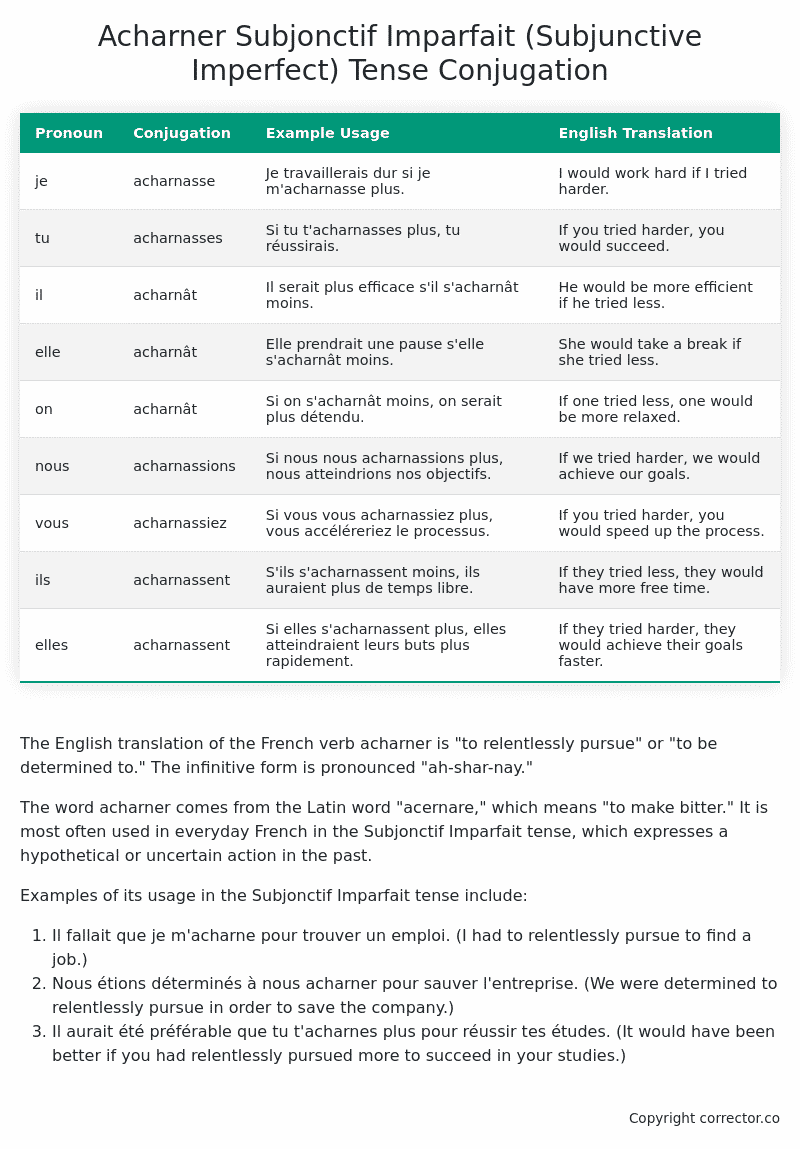Subjonctif Imparfait (Subjunctive Imperfect) Tense Conjugation of the French Verb acharner
Introduction to the verb acharner
The English translation of the French verb acharner is “to relentlessly pursue” or “to be determined to.” The infinitive form is pronounced “ah-shar-nay.”
The word acharner comes from the Latin word “acernare,” which means “to make bitter.” It is most often used in everyday French in the Subjonctif Imparfait tense, which expresses a hypothetical or uncertain action in the past.
Examples of its usage in the Subjonctif Imparfait tense include:
- Il fallait que je m’acharne pour trouver un emploi. (I had to relentlessly pursue to find a job.)
- Nous étions déterminés à nous acharner pour sauver l’entreprise. (We were determined to relentlessly pursue in order to save the company.)
- Il aurait été préférable que tu t’acharnes plus pour réussir tes études. (It would have been better if you had relentlessly pursued more to succeed in your studies.)
Table of the Subjonctif Imparfait (Subjunctive Imperfect) Tense Conjugation of acharner
| Pronoun | Conjugation | Example Usage | English Translation |
|---|---|---|---|
| je | acharnasse | Je travaillerais dur si je m’acharnasse plus. | I would work hard if I tried harder. |
| tu | acharnasses | Si tu t’acharnasses plus, tu réussirais. | If you tried harder, you would succeed. |
| il | acharnât | Il serait plus efficace s’il s’acharnât moins. | He would be more efficient if he tried less. |
| elle | acharnât | Elle prendrait une pause s’elle s’acharnât moins. | She would take a break if she tried less. |
| on | acharnât | Si on s’acharnât moins, on serait plus détendu. | If one tried less, one would be more relaxed. |
| nous | acharnassions | Si nous nous acharnassions plus, nous atteindrions nos objectifs. | If we tried harder, we would achieve our goals. |
| vous | acharnassiez | Si vous vous acharnassiez plus, vous accéléreriez le processus. | If you tried harder, you would speed up the process. |
| ils | acharnassent | S’ils s’acharnassent moins, ils auraient plus de temps libre. | If they tried less, they would have more free time. |
| elles | acharnassent | Si elles s’acharnassent plus, elles atteindraient leurs buts plus rapidement. | If they tried harder, they would achieve their goals faster. |
Other Conjugations for Acharner.
Le Present (Present Tense) Conjugation of the French Verb acharner
Imparfait (Imperfect) Tense Conjugation of the French Verb acharner
Passé Simple (Simple Past) Tense Conjugation of the French Verb acharner
Passé Composé (Present Perfect) Tense Conjugation of the French Verb acharner
Futur Simple (Simple Future) Tense Conjugation of the French Verb acharner
Futur Proche (Near Future) Tense Conjugation of the French Verb acharner
Plus-que-parfait (Pluperfect) Tense Conjugation of the French Verb acharner
Passé Antérieur (Past Anterior) Tense Conjugation of the French Verb acharner
Futur Antérieur (Future Anterior) Tense Conjugation of the French Verb acharner
Subjonctif Présent (Subjunctive Present) Tense Conjugation of the French Verb acharner
Subjonctif Passé (Subjunctive Past) Tense Conjugation of the French Verb acharner
Subjonctif Imparfait (Subjunctive Imperfect) Tense Conjugation of the French Verb acharner (this article)
Subjonctif Plus-que-parfait (Subjunctive Pluperfect) Tense Conjugation of the French Verb acharner
Conditionnel Présent (Conditional Present) Tense Conjugation of the French Verb acharner
Conditionnel Passé (Conditional Past) Tense Conjugation of the French Verb acharner
L’impératif Présent (Imperative Present) Tense Conjugation of the French Verb acharner
L’infinitif Présent (Infinitive Present) Tense Conjugation of the French Verb acharner
Struggling with French verbs or the language in general? Why not use our free French Grammar Checker – no registration required!
Get a FREE Download Study Sheet of this Conjugation 🔥
Simply right click the image below, click “save image” and get your free reference for the acharner Subjonctif Imparfait tense conjugation!

Acharner – About the French Subjonctif Imparfait (Subjunctive Imperfect) Tense
Formation
Common Everyday Usage Patterns
Interactions with Other Tenses
Subjonctif Présent
Indicatif Passé Composé
Conditional
Conditional Perfect
Summary
I hope you enjoyed this article on the verb acharner. Still in a learning mood? Check out another TOTALLY random French verb conjugation!


